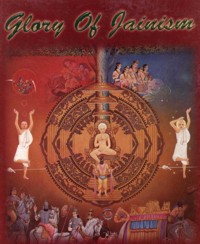Sadhvi Rushidatta
Dressed as a bride-groom, prince Kanakkumar along with his ministers, royal servants and guards, was passing through the jungle. On his way he saw that an aged ascetic was performing penance on a stone-seat and nearby him a beautiful girl was standing. Kanakkumar, son of king Hemrath, fell in love with the girl as soon as he saw her. Simultaneously he was surprised as to who would be that beautiful girl standing near a Rushi (saint with miraculous power) who was having on his body royal signs.
Rushi Harishen told him that once he was famous as king Harishen of Tambavati and he had with him a medicine to remove poison given to him by an ascetic. He used to remove poison of many persons with the help of that medicine. Pritimati, daughter of king Prithvipati of Manglavati, had a snake-bite and it was king Harishen who removed her poison. Since Harishen had given her new life, Prithvipati got princess Pritimati married to Harishen. Some years later king Harishen happened to listen to the sermon of Maharshi Vishvabhuti and he decided to abdicate his kingdom and the world and to go for penance. Queen Pritimati also became a nun to achieve fulfillment in life. But Pritimati was pregnant and she delivered a daughter after she became a nun. On the ninth day of the delivery, Pritimati passed away and Rushi Harishen acted as the bereaved girl’s father and named her as Rushidatta.
Rushi Harishen put a proposal to prince Kanakkumar to accept Rushidatta in marriage. She was extremely happy to have a husband like Kanakkumar. He was betrothed to Rukimini who felt insulted and being enraged, she decided to have her revenge on Rushidatta and with the help of yogini Sulasa (a meditative female with black magic), she managed to place a piece of mutton in Rushidatta’s bedroom and also to apply blood on her lips. Yogini Sulasa was active in killing humans every night in the city but she told the king that Rushidatta was a witch and man-eater. King Hemrath ordered that since Rushidatta was a witch she should be taken to the forest and should be burnt alive on a pyre with wet woods, so that she may die with utmost pain. He added that those who kill others mercilessly should die like this.
The pyre was lit in the forest but as there was heavy rain all around and total darkness in the forest, Rushidatta did not suffer any injury. Rushi Harishen had attained svargalok (heaven) by his death in deep meditation and with his divine knowledge he saw that Rushidatta, his daughter of his previous birth, was in great trouble. Hence he gave Rushidatta two types of knowledge with which she could change her form. With the aid of first type of knowledge she could have the desired form and with the power of the other form she could regain her original form.
When the marriage of Kanakkumar was arranged with Rukmini, Rushidatta assumed a divine form of a young Rushi. As the forecasts of young Rushi came to be true, Kanakkumar insisted that the Rushi should stay with him. Intoxicated with pride, Rukmini told Kanakkumar that it was at her instance that Sulasa yogini had indulged in human killing and it was she who had proved Rushidatta as a man-eater. Prince Kanakkumar became so furious that he rushed to behead her but soon he was prevented by that young Rushi. The young Rushi then regained his original form and became Rushidatta. Later Rushidatta came to know from Muni Dharmavijayji, who was in the city at that time, that whatever she suffered was the result of actions of her earlier birth. Hence Rushidatta decided to accept initiation and with severe penance she attained absolute knowledge and ultimately salvation.
 Dr. Kumarpal Desai
Dr. Kumarpal Desai

